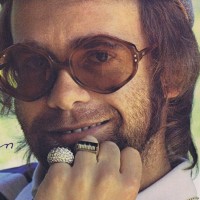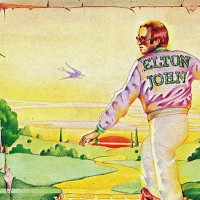A flurry of fetching 45s, accompanied by a clutch of adventurous LPs turned Elton John into one of the most artistically and commercially successful performers of the early ’70s. Chart-topping singles such as “Your Song,” “Honky Cat,” “Crocodile Rock,” “Bennie and the Jets,” “Don’t Let the Sun Go Down On Me,” “The Bitch is Back” and “Someone Saved My Life Tonight,” along with masterful albums like Madman Across the Water, Don’t Shoot Me I’m Only the Piano Player, Goodbye Yellow Brick Road and Captain Fantastic and the Brown Dirt Cowboy are all but a quick mention of the British singer, songwriter and pianist’s heyday accomplishments.
Comprised of 13 tracks, Greatest Hits 1976-1986 (MCA Records) obviously examines the second chapter of Elton John’s career. Although Elton was not quite as dominate a force as before, he still parented enough worthy moments to mingle comfortably among the slick corporate rock and synthesized dance music of the era.
If you were there during the summer of 1976, there was no getting away from “Don’t Go Breaking My Heart,” a cute bubblegummy soul duet between Elton and songbird Kiki Dee. Also released that year was “Sorry Seems to be the Hardest Word,” a moody and melancholic ballad sobbing with regret.
Additional tracks included on Greatest Hits 1976-1986 are the disco-sweetened “Mama Can’t Buy You Love” from 1979, the soft-and-shimmery pop of 1980’s “Little Jeannie,” and “Empty Garden (Hey Hey Johnny),” a stirring tribute to John Lennon that made the cut in the spring of 1982.
In 1983, Elton staged an astounding comeback in the form of the Too Low For Zero album. As expected, Greatest Hits 1976-1986 contains winning tickets from the disc. Highlights include a feisty, ’50s-styled rocker “I’m Still Standing,” the chattering and clattering new wave frequencies of “Kiss the Bride” “I Guess That’s Why They Call It the Blues” ripples and soars with majestic vocals, a persuasive chorus and features Stevie Wonder blowing a bout of cool harmonica trills. Each of these embody the focus and fire that restored Elton to creative glory.
Another notable number on Greatest Hits 1976-1986 is 1984’s “Sad Songs (Say So Much)” – which, despite its grim title, flowers forth to a tinsel and glitter sheen of happy harmonies and sweeping rhythms. The following year saw Elton John partner with George Michael and record “Wrap Her Up,” a funky floor shaker further heard on this collection.
The perfect present for the casual fan, Greatest Hits 1976-1986 weighs in as a credible demonstration of Elton John’s star power and ability to not only adapt, but contribute his own skills to the changing musical trends of this particular time period.
- ‘Magic’ Wasn’t One-Hit Wonder Pilot’s Only Quirky, Radio-Ready Treasure - April 18, 2025
- How ‘Hollies Sing Hollies’ Showed New Promise After Graham Nash’s Exit - November 14, 2024
- Barry Melton on Country Joe and the Fish, Woodstock – and That Chant - August 15, 2024




